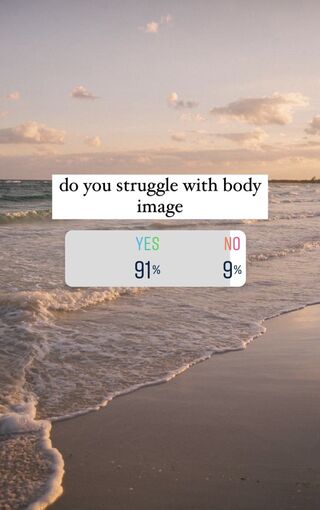OCD
Why Would a Person See a Monster in the Mirror?
Learn about one girl's struggles with Body Dysmorphia Disorder.
Posted July 30, 2021 Reviewed by Davia Sills
Key points
- Social media influencer Kalista Dwyer has been struggling with Body Dysmorphia Disorder since she was 10.
- Her story mirrors many people who whose distorted view of their appearance prevents them from enjoying a full life.
- Treatments like cognitive behavioral therapy and RIP-R can offer relief.

Imagine having intrusive and constant thoughts in your head that tell you that if you don't have eyeliner and/or eyelashes on, then you are ugly.
What must it be like to "cry about being born" because you feel so ugly, and thinking that if you don't look pretty, you have no self-worth?
Imagine avoiding getting together with friends or family because you are so uncomfortable with your appearance, and only being able to go out with a full face of makeup. These are common thoughts and behaviors of someone struggling with Body Dysmorphia Disorder (BDD).
One girl's struggles with Body Dysmorphia Disorder
The above examples are experiences that Kalista Dwyer has faced. Kalista is a 22-year-old social media influencer, from Nashville. Kalista has struggled with mental illness since the time she was 10 years old. She is now very open about her struggles and shares her story on social media in an effort to help others.
Kalista was diagnosed with BDD at the age of 17. Around this time, she started to lose weight and spend hours upon hours of her day putting on makeup and obsessing about what clothes she would wear. Unlike a non-BDD 17-year-old, without the makeup and clothes, Kalista would feel like the "ugliest person on the planet."
When a person struggles with BDD, their preoccupation with "defects" often leads to ritualistic behaviors, such as constantly looking in the mirror, picking at their skin, seeking reassurance about their looks from others, avoiding social interactions, and getting procedures at the dermatologist or plastic surgeon. Eventually, the person becomes so obsessed with the "defect" that their social and occupational functioning suffers.
How to get relief
All of these ritualistic and compulsive behaviors begin making the sufferer really start to believe that they are ugly and unworthy. The recommended treatment is usually cognitive behavioral therapy. Much like OCD therapy, the goal is to help the sufferer resist many of the unproductive and ritualistic behaviors they are doing, with the hopes that the person will start seeing themselves in a less distorted manner.
RIP-R therapy is helpful with this population; since the 10 interruption strategies can help the BDD sufferer resist doing many of their compulsive behaviors. (To learn about RIP-R therapy, see the article, "Can This New OCD Treatment Help Where Others Fall Short?") Allowing them to face the discomfort of "not knowing" whether they are truly "defective" or not. Also, in RIP-R therapy, the clinician guides the sufferer through a series of practice exercises, inspiring them to become more driven to resist doing some of their unhelpful rituals.

Since the pandemic, Kalista has been working on not wearing makeup and not using editing on her photos. She has been focusing on "loving" herself and being authentic with her audience. Through her journey, she has been extremely influential in helping others. Kalista recently put up an Instagram story, in which she polled her followers. She asked the question, "Do you struggle with body image?" An astounding 91 percent said yes.
BDD is a very serious problem that needs more focus and social awareness. Sadly, many with BDD go undiagnosed. Even therapists may miss this diagnosis or mistake it for something else. If you or your loved one feel you may be struggling with this condition, it is very important to seek help immediately from a qualified mental health professional who specializes in OCD and OC-related conditions.
To find a therapist, visit the Psychology Today Therapy Directory.


